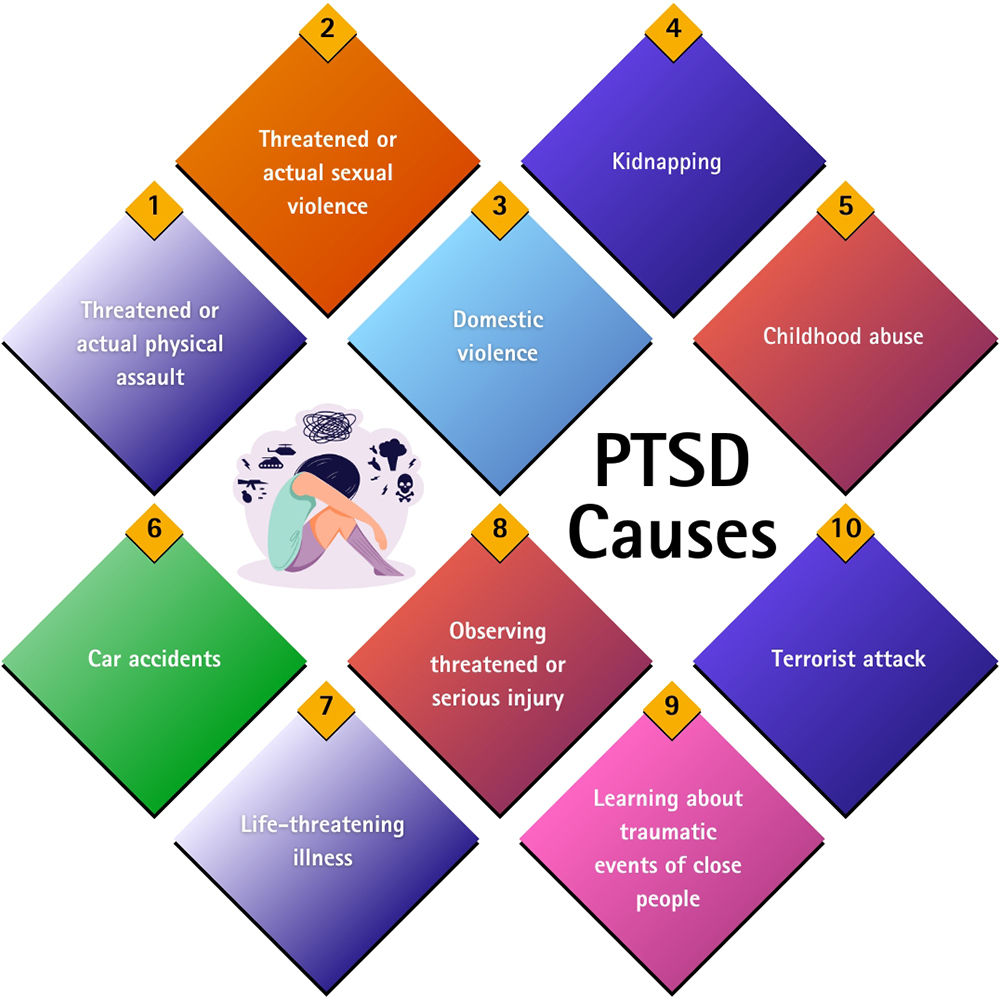Understanding PTSD

Post-Traumatic Stress Disorder (PTSD) is a mental health condition triggered by experiencing or witnessing a traumatic life event. It can affect individuals of all ages and backgrounds, leading to a range of symptoms that can significantly impair daily functioning.
People with PTSD often try to leave negative experiences behind by focusing on work, home responsibilities, and enjoyable activities. However, memories can still haunt us, with loud noises triggering shock, unexpected flashbacks, and nightmares disrupting sleep. Trauma’s effects can be insidious, leading to feelings of shame, anger, or low self-esteem, deteriorating relationships, and triggering anxiety and fear.
The counselors at the Trauma Therapy Center understand PTSD and complex posttraumatic stress disorder. Trauma therapy provides a structured way to process and heal your trauma symptoms and regain your self-esteem.
Trauma therapy with Certified Clinical Trauma Specialist Liz Chelak empowers you to maintain agency and gratitude throughout life. It equips you with essential coping skills to prevent future harm and re-traumatization.
Call to schedule an appointment for PTSD therapy today!
(561) 363-7994What Are the PTSD Causes and Risk Factors?
PTSD can be caused by experiencing a disturbing or distressful event. Often, when people hear of PTSD, they think of military trauma or a natural disaster. While these experiences can lead to PTSD symptoms, there is a wide range of events that can cause PTSD.
Some causes of PTSD include:
- Threatened or actual physical assault
- Threatened or actual sexual violence
- Kidnapping
- Childhood abuse
- Terrorist attack
- Car accidents
- Life-threatening illness
- Observing threatened or serious injury
- Domestic violence
- Learning about traumatic events of close people
These are just some examples of situations that can lead to PTSD symptoms. Any event that is perceived as traumatic or distressful can lead to similar symptoms.

Living With PTSD
It is estimated that up to 8% of the population will experience PTSD symptoms at some time in their life. People who have been in the military, have experienced sexual violence, or have been through multiple traumatic events are at a higher risk of experiencing PTSD.
Impacts of PTSD AND C-PTSD on your daily life include:
- Feeling intense and overwhelming emotions such as anxiety, anger, and shame
- Intrusive thoughts such as flashbacks or nightmares
- Avoiding reminders of traumatic memories
- Hypervigilance, irritability, or difficulty concentrating
- Relationship issues
- Issues with work and productivity
- Physical health problems, such as gastrointestinal issues, headaches, or fatigue
Trauma can have wide-reaching negative impacts on your life. However, with the right professional support, you can learn coping skills and move forward with your life without the negative impacts of trauma.
Excellent Practice with highly trained clinicians who truly care about their clients' well-being. They use evidence-based treatments tailored to fit each client's needs. Highly recommend to anyone seeking psychotherapy!
Liz is an amazing therapist and human being. She has helped me tremendously in my process of grief and trauma. She listens with an open mind and heart. She is compassionate and with an enormous amount of empathy. We are so lucky to have her in our community.
I've been to a few therapists, but Liz Chelak is in a league of her own. The techniques she used to help me combat trauma were amazing and highly effective. I continue to use some of the techniques. If you want someone who's not just going to 'chat' but really help you, hands down, give Liz Chelak a call.
Treatment Options
Importance of Seeking Professional Help
Dealing with trauma alone can be a challenging and overwhelming experience. Left untreated, symptoms will begin to worsen and can lead to major depressive disorder as well as physical health issues.
At the Trauma Therapy Center, you are guaranteed access to evidence-based PTSD and CPTSD treatment with supportive counselors who will support and guide you every step of the way.
Your therapist may diagnose PTSD using different methods, including:
- Diagostic and Statistical Manual (DMS-5)
- Standardized assessment tools
- Interview about your symptoms
Your therapist will discuss symptoms with you and suggest possible PTSD therapies. It is important to see a licensed mental health professional like Liz Chelak to receive an appropriate diagnosis.
Different Therapy Approaches
According to the National Institutes of Health (NIH), cognitive behavioral therapy (CBT) along with selective serotonin reuptake inhibitors (SSRIs) are the first line of treatment for PTSD.
Other popular and effective evidence-based interventions for PTSD include:
- Rational emotive behavioral therapy (REBT): Albert Ellis developed REBT as an action-oriented type of CBT. REBT helps the individual develop a new way of thinking based on disputing irrational beliefs.
- Eye movement desensitization and reprocessing (EMDR): EMDR involves eye movements or other bilateral stimulation which helps desensitize the emotional impacts of trauma.
- Narrative exposure therapy (NET): NET helps individuals create a coherent narrative of a traumatic event.
- Dialectical behavior therapy (DBT): DBT is a type of talk therapy that teaches you skills to change negative thoughts and deal with stressful situations.
- Prolonged exposure (PE): PE involves slowly and gradually confronting the traumatic experience in a safe environment to prevent avoidance that can cause PTSD symptoms.
- Cognitive processing therapy (CPT): CPT assists you with challenging and changing negative beliefs about yourself, others, and the world.
- Somatic therapy: This type of therapy focuses on the connection between the body and emotions to release stored emotions in the body.
You can choose a type of therapy based on your needs and personal preferences. Your therapist can give you more information about each type of therapy to help you choose.
The Role of Oral Medication on PTSD
Treatment of PTSD often includes both oral medication and psychotherapy. Oral medication can help manage the symptoms, but they do not treat the root cause of PTSD. Medication is a great way to help you get to a place where you can begin processing your trauma and healing.
Types of medications used for treating PTSD include:
- Selective serotonin reuptake inhibitors (SSRIs): SSRIs are a class of antidepressants that work on serotonin levels. They can help with depression symptoms and negative thoughts related to trauma. Some examples of SSRIs are Prozac (fluoxetine), Zoloft (sertraline), Paxil (paroxetine), and Lexapro (escitalopram).
- Serotonin-norepinephrine reuptake inhibitors (SNRIs): SNRIs work similarly to SSRIs but they also work on norepinephrine, as well as serotonin. Some examples of SNRIs are Effexor (venlafaxine) and Cymbalta (duloxetine).
- Prazosin: This medication was intended to treat high blood pressure but has been found to reduce nightmares associated with PTSD. Prazosin is also known by its brand name: Minipress.
- Beta blockers: Beta blockers are used in extreme cases to deal with the physical effects of PTSD such as a racing heart or shaking. Some examples of beta blockers include Inderal (propranolol) and Tenormin (atenolol).
It is important to remember that medication can complement therapy. Ask your psychiatrist or medical provider about the effects and symptoms of any medication you take.
What Is SGB Treatment for PTSD?
Stellate Ganglion Block, or SGB, is a procedure that involves an injection of a local anesthetic into the stellate ganglion. The injection inhibits nerve impulses sent to the brain and reduces the fight or flight response.
SGB is only used when all other treatment forms have been exhausted. It acts as a “reset” to the sympathetic nervous system.
SGB has shown positive results but is still a relatively new procedure with risks including hoarseness, a droopy eyelid, and changes in facial appearance due to muscle relaxation.
How Effective Are PTSD Treatments?
According to a Review of Evidence-Based Psychotherapy Interventions, up to 82.4% of participants treated with CBT lost their PTSD diagnosis. According to the study, researchers recommend PE, CPT, and trauma-focused CBT for the treatment of PTSD.
Can PTSD Come Back After Treatment?
PTSD is a complex disorder. Normally, symptoms of PTSD greatly improve or completely discontinue with treatment. However, it is possible in some cases for symptoms to come back after remission.
Some factors that can contribute to PTSD symptoms resurfacing include:
- Triggers: Exposure to triggers that remind you of the traumatic event can reactivate PTSD symptoms.
- Stress: Stressful life situations can temporarily cause PTSD symptoms to resurface.
- Discontinuing treatment: Sometimes people stop therapy when their symptoms go away. However, with PTSD long-term coping skills and maintenance are needed.
It’s important to maintain healthy habits to maintain PTSD remission. Make sure you are getting enough sleep, eating nutritious foods, and getting some physical exercise daily.
Our goal at the Trauma Therapy Center is to reduce your PTSD symptoms and empower you with the tools and thinking styles to prevent traumatization from future stressful or distressing experiences.
How Long Does PTSD Treatment Last?
The duration of PTSD treatment depends on your personal experiences, your therapist’s assessment, and the treatment plan you devise with your counselor.
Several factors that determine the length of treatment include:
- Severity of your symptoms
- Response to treatment
- Support system
Although the duration of PTSD therapy in West Palm Beach is your choice, Liz Chelak, LCSW, CCTSI, CRPS, recommends a minimum of 6 months to complete the somatic regulation, processing, and integration steps of trauma therapy.
Qualities to Look for in a Therapist

Finding the right therapist is a crucial part of your healing. According to renowned psychiatrist Irvin Yalom, “it’s the relationship that heals” over any specific intervention.
Important qualities to look for in a therapist include:
- Empathy: An empathetic therapist will listen nonjudgmentally and validate your experiences.
- Trustworthiness: Your therapist should value your confidentiality, respect professional boundaries, and maintain consistency.
- Cultural competence: A culturally competent therapist will be able to recognize the differences in different cultures and backgrounds.
- Communication skills: A therapist should be able to effectively communicate therapeutic concepts and be open to client feedback.
- Authenticity: An effective therapist should be genuine and authentic in all interactions in their lives to effectively teach their clients to accept and express themselves.
Liz Chelak is an experienced psychotherapist whom you can trust and feel comfortable with. As a Certified Clinical Trauma Specialist, she has the education and credentials to provide the right level of support while being open and flexible to work with your individual needs and preferences.
Finding an EMDR-Trained Therapist for PTSD Treatment
Depending on the individual and the specific nature of the trauma, EMDR therapy is often the best therapy for PTSD. EMDR therapists participate in post-graduate EMDR training and consultation. You can find an EMDR therapist at the Trauma Therapy Center in West Palm Beach or virtually, or search online on the EMDRIA website. As an EMDR-trained counselor, Liz Chelak utilizes a trauma-focused approach to help clients heal and achieve inner peace. Schedule consultations to get to know more about PTSD or CPTSD therapy in West Palm Beach.
Frequently Asked Questions About PTSD Treatment
How Much Does PTSD Treatment Cost?
The cost of PTSD treatment at the Trauma Therapy Center ranges from $200 to $300 per session.
Where To Get Help For PTSD Near Me?
Finding a PTSD therapist nearby is easy with a quick search for terms like “PTSD counseling near me,” “PTSD therapy near me,” or “complex PTSD counselor near me.” You can also ask your doctor, friends, or family for recommendations, and check online reviews to gauge a therapist’s reputation. Always confirm that the therapist is licensed and accredited.
Liz Chelak, LCSW, is experienced in trauma-focused therapies proven to help. Through techniques like EMDR and CBT, she guides clients in processing traumatic memories, reducing symptoms, and restoring control in their lives. Her approach prioritizes a safe, supportive environment for working through trauma, fostering healing and resilience for long-term relief.
What Are the 17 Symptoms of PTSD?
PTSD symptoms fall into four main categories:
Intrusive Thoughts:
- Unwanted and distressing memories of the traumatic event
- Recurrent, distressing dreams related to the trauma
- Flashbacks, or feeling like you’re reliving the traumatic event
- Severe emotional distress or physical reactions to reminders of the trauma
Avoidance:
- Avoiding places, activities, or people that remind you of the trauma
- Efforts to avoid thoughts, feelings, or conversations about the traumatic event
Negative Changes in Thinking and Mood:
- Negative thoughts about yourself, others, or the world
- Hopelessness about the future
- Memory problems, including not remembering important aspects of the traumatic event
- Difficulty maintaining close relationships
- Feeling detached from friends and family
- Lack of interest in activities you once enjoyed
- Difficulty experiencing positive emotions
Changes in Physical and Emotional Reactions:
- Being easily startled or frightened
- Always being on guard for danger
- Self-destructive behavior, such as drinking too much or driving too fast
- Trouble sleeping
- Trouble concentrating
- Irritability, angry outbursts, or aggressive behavior
- Overwhelming guilt or shame
If you’re seeking tailored treatment for PTSD in West Palm Beach, take the first step toward healing by booking a therapy appointment with us today. We offer personalized treatments like CBT and EMDR, which provide promising approaches to addressing the complex nature of PTSD. Effective therapy, combined with maintaining healthy habits and recognizing triggers, is essential for achieving positive outcomes.

